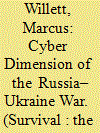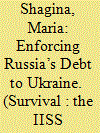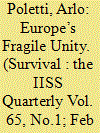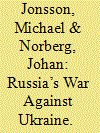|
|
|
Sort Order |
|
|
|
Items / Page
|
|
|
|
|
|
|
| Srl | Item |
| 1 |
ID:
187254


|
|
|
|
|
| Summary/Abstract |
The cyber dimension to the Russia–Ukraine war has been extensive. It reveals the characteristics of modern cyber conflict between well-matched states. While its predominant component has been a massive online ‘information’ battle for hearts and minds, comprehensibly amplified by private cyber-vigilante individuals and groups, it has also involved a large and concerted Russian campaign to disrupt Ukrainian critical infrastructure. This has been largely blunted by the soundness of Ukrainian cyber security, bolstered by Western assistance. Nevertheless, the risk remains that the cyber conflict could escalate beyond cyberspace to a more widespread confrontation between Russia and NATO. The chances of this happening are increased by uncertainty over the true nature of cyber operations, their responsible use, and especially how international law applies to them, making the efforts of states to address these issues urgently needed.
|
|
|
|
|
|
|
|
|
|
|
|
|
|
|
|
| 2 |
ID:
192139


|
|
|
|
|
| Summary/Abstract |
As Russia continues to wage war against Ukraine, Western calls to confiscate Russian frozen assets to aid Ukraine’s reconstruction have become more urgent. Whether justice on this score will be ultimately delivered remains unclear. Despite many international initiatives to seize Russian assets, legal conservatism and concerns over the disruption of international rules are strong constraints. Finding a legal way to confiscate Russian sovereign assets will require political determination, international coordination and legal creativity.
|
|
|
|
|
|
|
|
|
|
|
|
|
|
|
|
| 3 |
ID:
188803


|
|
|
|
|
| Summary/Abstract |
The EU is unlikely to develop the kinds of efficient collective responses to the Russia–Ukraine war that it produced in reaction to the COVID-19 pandemic. The conditions of strategic interdependence generated by the Ukraine crisis are more demanding than those triggered by the pandemic because its consequences are asymmetrically distributed across member states. Germany will find it difficult to play the role of regional stabiliser, anti-Europe parties could become stronger, new intra-European cleavages may arise over collective goals, and the expansion of the crisis’s time horizon could weaken prospects for effective collective action.
|
|
|
|
|
|
|
|
|
|
|
|
|
|
|
|
| 4 |
ID:
188456


|
|
|
|
|
| Summary/Abstract |
After Vladimir Putin declared a partial Russian mobilisation in late September 2022 and annexed four additional Ukrainian regions, there was little to suggest that a negotiated settlement would be possible while he remained in power. This article instead explores three possible military outcomes of the war – an outright Ukrainian or Russian military victory, and a war of attrition. As of November 2022, a Ukrainian victory, so unlikely at the outset of Russia’s invasion, is a distinct possibility, provided the West offers sufficient military materiel and training swiftly enough. Russian forces have suffered heavy casualties and are low on precision-guided munitions, with their logistics under fire and having lost much of what air dominance they had. Hence, Moscow’s battlefield fortunes hinge on whether mobilised, poorly trained and equipped forces will be able to hold defensive lines over the winter to buy time to build new, more capable units, with troop morale ever more crucial, but also brittle. A key unknown, however, is the state of Ukrainian forces. Importantly, the scale and intensity of the war, the vital interests at stake and international involvement on both sides all gravitate towards a more drawn-out war over the winter and beyond.
|
|
|
|
|
|
|
|
|
|
|
|
|
|
|
|
| 5 |
ID:
192801


|
|
|
|
|
| Summary/Abstract |
We provide first causal evidence of effects of the energy crisis on Germany, the largest economy in Europe. Combining cost structure data, national accounts and administrative labour market data, we identify effects in a sectoral panel setting using sector-specific energy intensity as a “bite” variable. The results show that through the channel of energy intensity, monthly production and real turnover decreased by 4.1 and 2.6 per cent, respectively, after the onset of the Russia–Ukraine war. Instead of layoffs, firms safeguarded employment by means of short-time work, with a 24.1 per cent increase in notifications. Vacancy posting was reduced by 10.3 per cent.
|
|
|
|
|
|
|
|
|
|
|
|
|
|
|
|
|
|
|
|
|